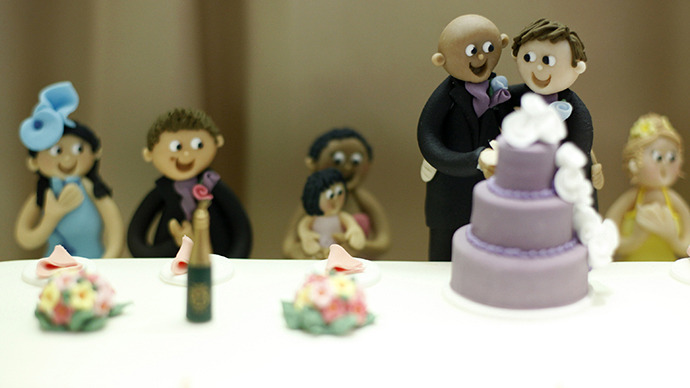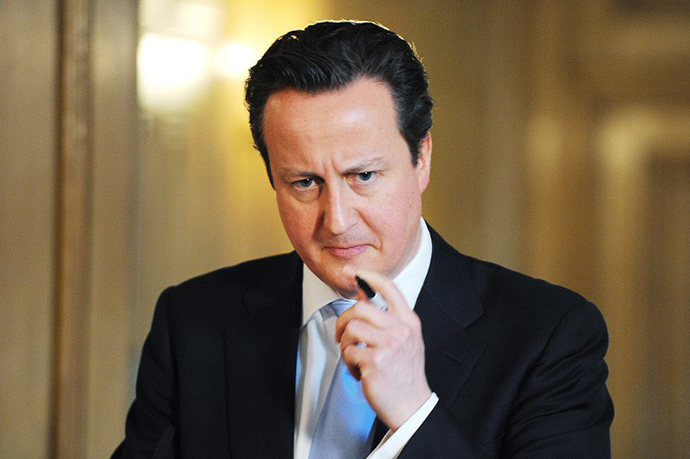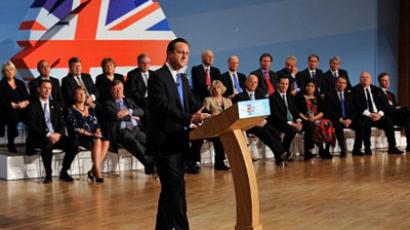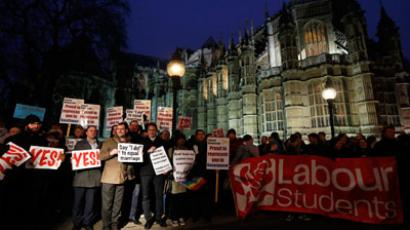‘Perfect political storm’: Opposition deal saves floundering UK gay marriage bill

Britain’s ruling Conservative party has been forced by its uncooperative members into making a deal with the opposition to ensure the quick passage of a gay marriage bill in the face of plummeting support and anger over ‘swivelgate.’
Almost 40 percent of David Cameron’s 303 Member of Parliament
rebelled against the bill, voting on a – now defunct – amendment,
which would have allowed registrars to refuse to conduct gay
marriage ceremonies should they personally object, and could have
even delayed the issue until after the next general election,
expected in 2015.
The attempt to force through the Marriage (Same Sex Couples) Bill is controversial within the traditionalist ranks of the Conservatives, leading one MP to label comment on Monday that “there are plenty in the aggressive homosexual community who see this as but a stepping stone to something even further.” However, Cameron is determined to force it through.
When it became clear that the UK PM did not have enough support from his own party, the Conservative chief whip, George Young, was forced to appeal to the opposition leader, Ed Miliband (Labour), who had been planning to abstain from voting.
Labour’s change of heart led to the defeat of the amendment 375 to 70 votes, saving the bill by a majority of 305 and illuminating a deep cleft within the ruling party.
The bill will have its third and final reading in the House of Commons on Tuesday, the day after which it will pass to the House of Lords, where further opposition is expected.
Relying on opposition backing signifies difficult times ahead for the ruling Conservative party.
“It's a perfect political storm. It couldn't have come at a
worse time for Cameron,” Iain Dale, a prominent British gay
radio presenter and conservative blogger, told Reuters.

The latest YouGov poll for the Sunday Times found that 54% of
Britons support “changing the law to allow same-sex couples to
marry,” with over 53,000 civil partnership ceremonies have been
carried out since their introduction in December 2005.
Conversely, only 45% of Tory supporters are in favor of changing
the law and 48% oppose it, the survey showed.
Cameron is eager to force its passage, in attempts to display his
party’s liberal and progressive side, particularly following
spending cuts and a lurch to the right on immigration policy, which
a number of parties are pursuing following a recent surge in UKIP
popularity.
On Saturday, a group of Conservative chairmen delivered a note to
Downing Street, stating that his “proposal to redefine marriage
is flawed, un-conservative, divisive and costing us dearly,”
saying that the PM was treating loyal grassroots members “with
contempt,” concluding that “some [former party members] of course
are joining UKIP.”
The sudden urgency in passing the flagship policy shortly
follows the recent ‘swivelgate’ scandal, in which a leading member
of the Conservative party referred to party activists as
“swivel-eyed-loons.” “Loon” is a derogatory and archaic term
for a crazy person.
Conservative party chairman Andrew Feldman was forced to deny that
he was the source of the comments after Twitter erupted with
allegations that it was him, and activists have demanded an
apology.
Usage of the phrase became almost viral across British media over
the weekend, causing one MP to comment that his wish for anti-gay
marriage supporters to be given protection under the Equality Act
2010 was not because he was “swivel-eyed.”
Alongside deep divisions within the party, there has been doubt
over their hopes in the next general election. Conservatives
would currently garner a mere 29 percent of the UK public vote,
with Labour taking 37 percent, and the Liberal Democrats 10
percent, according to UK Polling Report which averages the results
of 10 different national polls.














